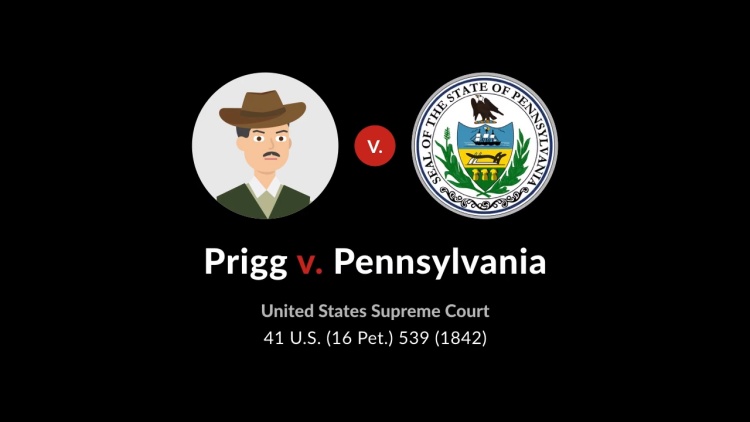Prigg v. Pennsylvania
United States Supreme Court
41 U.S. (16 Pet.) 539 (1842)

- Written by Josh Lee, JD
Facts
In 1837, Edward Prigg (defendant) captured Margaret Morgan and her children in Pennsylvania. Prigg claimed that Morgan was a fugitive slave. Pennsylvania was a non-slave-holding state and was a common refuge for fugitive slaves. The federal Fugitive Slave Act of 1793 authorized the owner of a fugitive slave to seize the slave and bring the slave before a federal judge or state magistrate to obtain a certificate after proving that the slave was actually a fugitive slave. Prigg did not prove that Morgan was a slave before any federal judge or state magistrate in Pennsylvania. Instead, Prigg forcibly removed Morgan and her children to Maryland, where a county judge adjudged them to be slaves. Prigg was charged and convicted under a Pennsylvania law designed to prevent self-help in the return of fugitive slaves. Prigg challenged this law as unconstitutional.
Rule of Law
Issue
Holding and Reasoning (Story, J.)
Concurrence (Taney, C.J.)
Dissent (McLean, J.)
What to do next…
Here's why 907,000 law students have relied on our case briefs:
- Written by law professors and practitioners, not other law students. 47,100 briefs, keyed to 996 casebooks. Top-notch customer support.
- The right amount of information, includes the facts, issues, rule of law, holding and reasoning, and any concurrences and dissents.
- Access in your classes, works on your mobile and tablet. Massive library of related video lessons and high quality multiple-choice questions.
- Easy to use, uniform format for every case brief. Written in plain English, not in legalese. Our briefs summarize and simplify; they don’t just repeat the court’s language.





